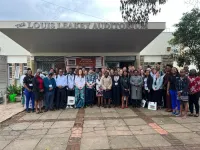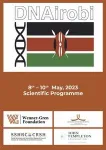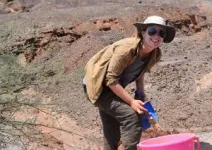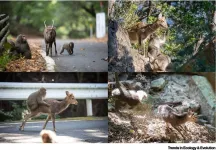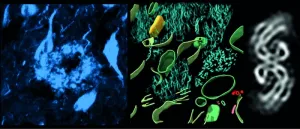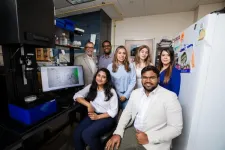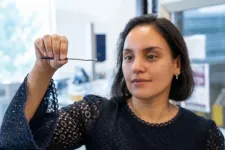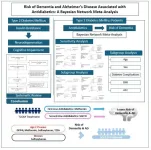(Press-News.org) CLEVELAND AND NAIROBI — July 11, 2024 — Today, the American Journal of Human Genetics published a perspective piece on the need for an equitable and inclusive future for DNA and ancient DNA (aDNA) research in Africa. The paper, coauthored by an international team of 36 scientists from Africa, North America, Asia, Australia, and Europe, was led by Dr. Elizabeth (Ebeth) Sawchuk of the Cleveland Museum of Natural History and Dr. Kendra Sirak of Harvard University.
DNA from ancient and living African peoples is critical for researchers studying our species’ evolution and population history. Africa is home to the greatest human genetic diversity on the planet, and only a fraction of that diversity has been studied to date. However, with scientific advances over the past decade, the situation is changing rapidly. More genomic data from ancient and living African people are published every year, and African DNA and aDNA research is poised to dramatically increase in the next decade. Yet, despite growing international research interest in Africa, African scientists remain starkly underrepresented on research teams and in the process of planning and executing scientific projects.
“Step one is to discuss African research in Africa,” says Dr. Sawchuk, the Cleveland Museum of Natural History’s Associate Curator of Human Evolution. “Many African scholars face major barriers to attending genetics conferences held in North America and Europe, limiting their ability to lead and partner in DNA and aDNA research. Holding conversations in Africa allows voices and perspectives that have been historically sidelined to be heard.”
This new paper is one outcome of the groundbreaking “DNAirobi” workshop held at the National Museums of Kenya in May 2023 and co-organized by scientists at the Cleveland Museum of Natural History, National Museums of Kenya, Harvard University, and Rice University. DNAirobi brought together geneticists, archaeologists, and educators from across Africa and around the world to discuss the future of population history-focused DNA and aDNA research on the continent. The article captures the results of these conversations and presents a bold vision for what the research landscape should look like in ten years’ time.
“This study involved researchers from both the Global North and the Global South and underscores the potential DNA and ancient DNA hold for understanding ancient and modern human populations” said Dr. Fredrick Kyalo Manthi, Director of Antiquities, Sites and Monuments for the National Museums of Kenya. “It amplifies the need to train more African scholars, particularly in studies related to ancient DNA.”
The article also acknowledges and addresses the challenges associated with DNA and aDNA research in Africa and beyond. Studying genetic sequences, whether modern or ancient, requires great care because such research can impact both the living and the dead. Scholars widely agree that such work should be the product of equitable partnerships, engage diverse audiences (including communities relevant to research), encompass a range of perspectives, and create opportunities for capacity building. A growing number of papers over the past decade have focused on the ethics of genetics research, yet it remains difficult to adapt general
best practice recommendations to specific geographic contexts. Developing a roadmap for ethical DNA and aDNA research in Africa is particularly challenging because fewer studies have been done on the continent and guidelines developed in other parts of the world are not always a good fit.
However, the new paper goes beyond creating an Africa-specific set of guidelines for genomic research. “We all want to carry out research that is equitable, engaged, and inclusive,” said Dr. Sirak, Research Associate in the Department of Human Evolutionary Biology at Harvard University. “Our paper examines some of the structural barriers that currently stand in the way of creating a research ecosystem that facilitates this type of research—for example, a lack of accessible training opportunities, ineffective communication between scientists and the interested public, and a history of exploitative research practices on the African continent. We attempt to articulate how we as researchers can encourage the continued growth of ethical genomics research in Africa with high-level structural changes to the way that science is designed and supported, that we know must ultimately take place.”
Ultimately, there is no singular path forward for DNA and aDNA research in Africa. Instead, as research landscapes evolve alongside science and society, scholars will need to remain flexible and adapt to new challenges and opportunities. To help with this process, the paper’s authors identify several “landmarks” to guide teams toward an equitable and inclusive future for genomics research. These include changing how and with whom we communicate results, reimagining what equitable partnerships look like, and focusing on improving scientific literacy for all. Effectively implementing best practices for ethical DNA and aDNA research requires addressing deep imbalances in power and resources.
“We seek to build a dynamic research ecosystem in which African scholars can effectively lead and partner in genomics research, and access the collaborators, labs, and funding they need to achieve their goals” said Dr. Christine Ogola, Head of Archaeology at the National Museums of Kenya. “The solution is not to immediately build population history-focused DNA and aDNA labs on the continent, which would be unrealistic at present to staff and maintain. Instead, we need to focus on building capacity and infrastructure in ways that sustainably support research leadership.”
The authors conclude the article with a call to action for labs and funding bodies to commit more resources to African scholars, either directly or in cooperation with institutions that provide training and capacity building opportunities. There is a fundamental tension between fast genomics research driven by labs that must generate and publish results to secure funding, and the slow work of meaningfully engaging communities to build trust and equitable partnerships. Until there is infrastructural support to create the desired equitable research ecosystem, it will remain challenging to implement best practices for African DNA and aDNA research.
“Africans are the primary knowledge holders of African samples, data, and historical contexts. We want more access to DNA and aDNA research and the resources and training to support more African-led studies in the future” says Dr. Emmanuel Ndiema, Head of Earth Sciences for the National Museums of Kenya. “An ethical and equitable future for African genomics research requires investing in entire societies and the next generation of scholars, work that will take decades and have impacts that go far beyond genetics research.”
Media Contacts:
Samantha Guenther, External Communications Manager
Cleveland Museum of Natural History
440-429-2902
sguenther@cmnh.org
Dr. Elizabeth Sawchuk, Associate Curator of Human Evolution
Cleveland Museum of Natural History
+254-794-463-267 or WhatsApp +1 216-463-1089
esawchuk@cmnh.org
Dr. Kendra Sirak, Research Associate
Harvard University & Harvard Medical School
570-417-3905
kendra_sirak@fas.harvard.edu
END
Charting an equitable future for DNA and ancient DNA research in Africa
New paper in the American Journal of Human Genetics sets a vision for how to achieve equitable genomics research in Africa in ten years’ time
2024-07-11
ELSE PRESS RELEASES FROM THIS DATE:
Introducing co-cultures: When co-habiting animal species share culture
2024-07-11
Cooperative hunting, resource sharing, and using the same signals to communicate the same information—these are all examples of cultural sharing that have been observed between distinct animal species. In an opinion piece published June 19 in the journal Trends in Ecology & Evolution, researchers introduce the term “co-culture” to describe cultural sharing between animal species. These relationships are mutual and go beyond one species watching and mimicking another species’ behavior—in co-cultures, both species influence each other in substantial ways.
“Co-culture challenges the notion ...
Study finds health risks in switching ships from diesel to ammonia fuel
2024-07-11
As container ships the size of city blocks cross the oceans to deliver cargo, their huge diesel engines emit large quantities of air pollutants that drive climate change and have human health impacts. It has been estimated that maritime shipping accounts for almost 3 percent of global carbon dioxide emissions and the industry’s negative impacts on air quality cause about 100,000 premature deaths each year.
Decarbonizing shipping to reduce these detrimental effects is a goal of the International Maritime Organization, ...
Seeing inside Alzheimer’s disease brain
2024-07-11
Scientists investigating Alzheimer’s disease have determined the structure of molecules within a human brain for the very first time.
Published today in Nature, the study describes how scientists used cryo-electron tomography, guided by fluorescence microscopy, to explore deep inside an Alzheimer’s disease donor brain.
This gave 3-dimensional maps in which they could observe proteins, the molecular building blocks of life a million-times smaller than a grain of rice, within the brain.
The study zoomed in on two proteins that cause dementia– ‘β-amyloid’, a protein that forms microscopic ...
Nanoplastics and ‘forever chemicals’ disrupt molecular structures, functionality
2024-07-11
EL PASO, Texas (July 11, 2024) – Researchers at The University of Texas at El Paso have made significant inroads in understanding how nanoplastics and per- and polyfluoroalkyl substances (PFAS) — commonly known as forever chemicals — disrupt biomolecular structure and function. The work shows that the compounds can alter proteins found in human breast milk and infant formulas — potentially causing developmental issues downstream.
Nanoplastics and forever chemicals are manmade compounds present throughout the environment; a series of recent studies have linked them to numerous ...
Quadrupolar nuclei measured for the first time by zero-field NMR
2024-07-11
What is the structure of a particular molecule? And how do molecules interact with each other? Researchers interested in those questions frequently use nuclear magnetic resonance (NMR) spectroscopy to find answers. In NMR, a powerful external magnetic field is employed to align the spins of atomic nuclei, which are then induced to rotate by an oscillating weak magnetic field generated by coils. A change in voltage as a result can be converted to measurable frequencies. Based on this, researchers can identify the molecular structures while also revealing ...
UT Arlington research contributes $226 million to U.S. economy
2024-07-11
A new report shows that research projects at The University of Texas at Arlington contributed one quarter of a billion dollars—$226.4 million, to be exact—to the national economy through 797 vendor contracts and subcontracts between 2018 and 2022. Of those contracts, 111 were from small businesses and 87 from minority- or woman-owned businesses.
“Research coming from UT Arlington faculty and students not only helps solve some of society’s most vexing problems, but it is also an important economic driver for business development,” said Kate C. Miller, vice president for research and innovation at UTA. “This report makes clear that UTA research ...
Researchers develop a way to make lifesaving phages accessible, transportable and much easier to use
2024-07-11
The great promise of bacteriophages is that they naturally destroy bacteria, often in situations where antibiotics fail.
Until now, though, there has been no way to access them quickly and efficiently, especially in emergency cases of antibiotic resistant infections.
Researchers at McMaster University, working with a colleague from Université Laval, have developed a simple new way to store, identify, and share phages, making them more accessible to patients who need them.
“Bacteriophages ...
MD Anderson Research Highlights for July 11, 2024
2024-07-11
HOUSTON ― The University of Texas MD Anderson Cancer Center’s Research Highlights provides a glimpse into recent basic, translational and clinical cancer research from MD Anderson experts. These advances are made possible through seamless collaboration between MD Anderson’s world-leading clinicians and scientists, bringing discoveries from the lab to the clinic and back.
Recent developments at MD Anderson offer insights into mechanisms regulating metabolic programming and cellular senescence, ...
Metformin and other antidiabetic drugs can help reduce the risk of dementia in patients with type 2 diabetes
2024-07-11
Ann Arbor, July 11, 2024 – Investigators analyzing the potential cognitive effects of antidiabetic medications in records of more than 1.5 million patients with type 2 diabetes mellitus (T2DM) found risks of dementia and Alzheimer’s disease (AD) were significantly lower in patients treated with metformin and sodium glucose co-transporter-2 inhibitors (SGLT-2i) compared to other antidiabetic drugs. Their results appear in the American Journal of Preventive Medicine, published by Elsevier.
T2DM has become ...
First ever 3D reconstruction of 52,000-year-old woolly mammoth chromosomes thanks to serendipitously freeze-dried skin
2024-07-11
An international research team has assembled the genome and 3D chromosomal structures of a 52,000-year-old woolly mammoth—the first time such a feat has been achieved for any ancient DNA sample. The fossilized chromosomes, which are around a million times longer than most ancient DNA fragments, provide insight into how the mammoth’s genome was organized within its living cells and which genes were active within the skin tissue from which the DNA was extracted. This unprecedented level of structural detail was retained because ...
LAST 30 PRESS RELEASES:
Kidney cancer study finds belzutifan plus pembrolizumab post-surgery helps patients at high risk for relapse stay cancer-free longer
Alkali cation effects in electrochemical carbon dioxide reduction
Test platforms for charging wireless cars now fit on a bench
$3 million NIH grant funds national study of Medicare Advantage’s benefit expansion into social supports
Amplified Sciences achieves CAP accreditation for cutting-edge diagnostic lab
Fred Hutch announces 12 recipients of the annual Harold M. Weintraub Graduate Student Award
Native forest litter helps rebuild soil life in post-mining landscapes
Mountain soils in arid regions may emit more greenhouse gas as climate shifts, new study finds
Pairing biochar with other soil amendments could unlock stronger gains in soil health
Why do we get a skip in our step when we’re happy? Thank dopamine
UC Irvine scientists uncover cellular mechanism behind muscle repair
Platform to map living brain noninvasively takes next big step
Stress-testing the Cascadia Subduction Zone reveals variability that could impact how earthquakes spread
We may be underestimating the true carbon cost of northern wildfires
Blood test predicts which bladder cancer patients may safely skip surgery
Kennesaw State's Vijay Anand honored as National Academy of Inventors Senior Member
Recovery from whaling reveals the role of age in Humpback reproduction
Can the canny tick help prevent disease like MS and cancer?
Newcomer children show lower rates of emergency department use for non‑urgent conditions, study finds
Cognitive and neuropsychiatric function in former American football players
From trash to climate tech: rubber gloves find new life as carbon capturers materials
A step towards needed treatments for hantaviruses in new molecular map
Boys are more motivated, while girls are more compassionate?
Study identifies opposing roles for IL6 and IL6R in long-term mortality
AI accurately spots medical disorder from privacy-conscious hand images
Transient Pauli blocking for broadband ultrafast optical switching
Political polarization can spur CO2 emissions, stymie climate action
Researchers develop new strategy for improving inverted perovskite solar cells
Yes! The role of YAP and CTGF as potential therapeutic targets for preventing severe liver disease
Pancreatic cancer may begin hiding from the immune system earlier than we thought
[Press-News.org] Charting an equitable future for DNA and ancient DNA research in AfricaNew paper in the American Journal of Human Genetics sets a vision for how to achieve equitable genomics research in Africa in ten years’ time
